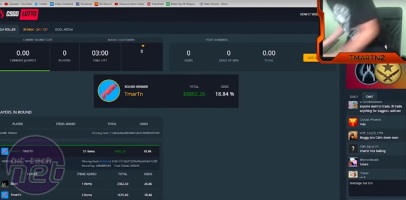Games journalism isn't corrupt, but Youtube has a problem.
September 2, 2016 | 09:18

Allegations of corruption have dogged games journalism for almost as long as games journalism has existed. Where exactly this belief stems from isn’t entirely certain. But if you went by the average comments section on a game review, you’d think the entirety of games journalism was more corrupt than Silvio Berlusconi’s hard-drive.
Like any form of journalism, games media isn’t short of examples of shoddy work. Evidence of that goes as far back as dodgy reviews of games like Nemesis for the ZX Spectrum, where Sinclair User appear to have reviewed a beta version of the game in order to get ahead of the competition. But the vast majority of complaints and conspiracy theories about games writing aren’t concerned with laziness or cutting corners. Instead, they revolve around a very specific and far more serious subject – the idea that critics are routinely paid-off by publishers to artificially inflate review scores.
[break]
This particular accusation has a number of roots, where general grumbling over review scores online and in magazines merge with individual incidents of games critics simply calling it wrong, such as the infamous 'Driver3gate', where a number of high-profile magazines gave lofty scores to a game that quickly proved itself to be terrible. Over time, the pressure has built to the point where a substantial portion of the gaming community believe that entire websites are in the pockets of EA, Ubisoft et al.

It isn’t possible to prove categorically that games journalism is entirely free of corruption, in the same way it isn’t possible to prove that the Universe doesn’t exist inside a giant snowglobe. But the community’s perception of corruption is massively out of whack. The majority of corruption accusations are entirely unwarranted, and the few examples that do raise an eyebrow usually conflate unethical behaviour with a critic making a simple mistake (such as when I overscored Rome II a couple of years ago. It happens to everyone!). Nevertheless, the relentlessness of the accusations, which came to a head during the malicious, veiled hate-campaign that was GamerGate, have done untold damage to the reputation of games journalism, criticism and reporting.
The general mistrust of traditional media by the games community has, in part, helped pave the way for a new wave of gaming commentators – YouTubers. Viewed as a refreshing alternative voice that grew up independently of the corrupting influence of games journalism, YouTubers have become the new darlings of gaming coverage. Some YouTubers have a following and resulting power that the largest gaming websites – never mind individual journalists – could only dream of.
Whether or not the perception of YouTubers as an 'alternative' is accurate, the rise of YouTube stars nonetheless offered an exciting new opportunity for gaming coverage, a chance for commentators to stand toe-to-toe with the larger publishers, able to stand apart from the rigorous marketing campaigns and PR-controlled messages that have stifled traditional journalism in recent years. Unfortunately, this hasn’t happened. Instead, YouTubers have become embroiled in levels of corruption that traditional games journalism has never come close to.

Only last month, two jaw-dropping stories about dodgy practices by YouTubers emerged. The Counter Strike: Global Offensive community has been rocked by an astounding story about several CS:GO gambling sites – where players can bet on matches to win skins – being owned by YouTubers who promoted the sites in their videos. One such YouTuber, who goes by the monicker TmarTn, posted a video of himself allegedly winning $13,000 on a gambling site that he himself had founded. Since then, other YouTubers like the CS:GO team FaZe have been implicated in similar unethical practice, while several class-action lawsuits have been filed against the perpetrators and even Valve themselves, for letting what is essentially an illegal gambling den (many of the individuals putting money down on these sites were children) emerge right under their noses.
About a week later, a second story appeared in which the American Federal Trade Commission had reached a settlement with Warner Bros after the publisher failed to disclose that it had paid several prominent YouTubers, such as PewDiePie, specifically for positive coverage of their game. As part of the settlement, the FTC also banned Warner Bros from further pretending that paid-for coverage was the work of independent producers.

While the first story is undoubtedly the more remarkable of the two, it’s the second story I want to focus on here. This is because the likes of TmarTn and the FaZe team have been almost universally condemned for their repulsively unethical and exploitative behaviour (incidentally, it should be pointed out that it was a YouTuber by the name of HonorTheCall who blew the lid off the CS:GO gambling fiasco, demonstrating that the medium is capable of well-researched and effective journalism).

Meanwhile, the latter story has all-but been shrugged off. PewDiePie’s response to the journalists who ran the Warner Bros story was that he is an 'entertainer' rather than a professional critic and 'doesn’t need' games journalism, while Warner Bros were the bad guys as far as the FTC was concerned, and not the YouTubers in question.
It’s true that PewDiePie has been made a bit of a scapegoat in this story. He in fact was one of the only YouTubers to disclose he had been paid by Warner Bros for his positive coverage, although said disclosure was hardly overt for the video in question. But this doesn’t excuse the other YouTubers who didn’t make the same disclosure, or just how incredibly shady such practice is anyway. What’s more, the FTC later ruled that the disclosures made by PewDiePie and other YouTubers were inadequate anyway.

What’s particularly galling and worrisome about this story is that the YouTubers in question are doing the exact thing that traditional games journalism has been baselessly accused of for literally decades - taking money in exchange for positive coverage. It’s the very collusion that GamerGate attempted to legitimise itself upon. Had a traditional journalist been caught embarking upon the same course of action, it would have cost them their career.

YouTubers appear to be shielded from criticism by two things: transparency, and the label of 'entertainer'. Personally, I find the label of entertainer a dubious one. YouTubers are still offering their opinions on games to (often massive) audiences, who will base their own purchases upon the conclusions drawn by their chosen channel. What’s more, most games journalists are not truly journalists either, instead practising a mixture of reporting, criticism and entertainment writing in a similar vein to most YouTubers. Yet games journalists are still held, or hold themselves, to ethical standards. Regardless, here we have a clear-cut case of a serious breach of ethics by YouTubers, and not only have there been no repercussions, the perception of YouTubers as a haven of independent, unsullied games coverage seemingly remains intact.

If you’re reading this and thinking it’s a case of sour grapes, I won’t lie, the situation absolutely infuriates me. I’ve seen friends harassed and the careers of some colleagues almost destroyed through accusations over perceived corruption of the exact kind that YouTubers do both openly and surreptitiously on a daily basis. But I also have genuine concerns about the future of gaming coverage. Because of the conflation of advertising and entertainment, an entire generation of children are growing up believing that paid-for opinions are the standard for gaming coverage, and that’s assuming they are aware these opinions have been paid for in the first place.
Most of all, though, I find it desperately sad that so many YouTubers have the opportunity to work as an entirely independent authority on games, supported by the trust and goodwill of their audiences, and use that opportunity to line their pockets with money from major publishers. Even if you believe such an action isn’t unethical, it’s horrendously crass and tacky.
This is not to say that all YouTubers are corrupt; far from it. Much as I dislike current YouTube culture, I would hate for the medium to be tarred with the same brush that games journalism has been so unjustly. But there are undoubtedly problems within YouTube culture that need addressing, problems which exist to an extent that they never did in traditional games media. How exactly these problems can be addressed is difficult to say, given the independent nature of many YouTubers which lends them such power and potential as voices within the industry. The work of more upstanding individuals like HonorTheCall is a good start, but these more rigorous investigative practices and attention to potential corruption need to become the rule rather than the exception.
Like any form of journalism, games media isn’t short of examples of shoddy work. Evidence of that goes as far back as dodgy reviews of games like Nemesis for the ZX Spectrum, where Sinclair User appear to have reviewed a beta version of the game in order to get ahead of the competition. But the vast majority of complaints and conspiracy theories about games writing aren’t concerned with laziness or cutting corners. Instead, they revolve around a very specific and far more serious subject – the idea that critics are routinely paid-off by publishers to artificially inflate review scores.
[break]
This particular accusation has a number of roots, where general grumbling over review scores online and in magazines merge with individual incidents of games critics simply calling it wrong, such as the infamous 'Driver3gate', where a number of high-profile magazines gave lofty scores to a game that quickly proved itself to be terrible. Over time, the pressure has built to the point where a substantial portion of the gaming community believe that entire websites are in the pockets of EA, Ubisoft et al.

It isn’t possible to prove categorically that games journalism is entirely free of corruption, in the same way it isn’t possible to prove that the Universe doesn’t exist inside a giant snowglobe. But the community’s perception of corruption is massively out of whack. The majority of corruption accusations are entirely unwarranted, and the few examples that do raise an eyebrow usually conflate unethical behaviour with a critic making a simple mistake (such as when I overscored Rome II a couple of years ago. It happens to everyone!). Nevertheless, the relentlessness of the accusations, which came to a head during the malicious, veiled hate-campaign that was GamerGate, have done untold damage to the reputation of games journalism, criticism and reporting.
The general mistrust of traditional media by the games community has, in part, helped pave the way for a new wave of gaming commentators – YouTubers. Viewed as a refreshing alternative voice that grew up independently of the corrupting influence of games journalism, YouTubers have become the new darlings of gaming coverage. Some YouTubers have a following and resulting power that the largest gaming websites – never mind individual journalists – could only dream of.
Whether or not the perception of YouTubers as an 'alternative' is accurate, the rise of YouTube stars nonetheless offered an exciting new opportunity for gaming coverage, a chance for commentators to stand toe-to-toe with the larger publishers, able to stand apart from the rigorous marketing campaigns and PR-controlled messages that have stifled traditional journalism in recent years. Unfortunately, this hasn’t happened. Instead, YouTubers have become embroiled in levels of corruption that traditional games journalism has never come close to.

Only last month, two jaw-dropping stories about dodgy practices by YouTubers emerged. The Counter Strike: Global Offensive community has been rocked by an astounding story about several CS:GO gambling sites – where players can bet on matches to win skins – being owned by YouTubers who promoted the sites in their videos. One such YouTuber, who goes by the monicker TmarTn, posted a video of himself allegedly winning $13,000 on a gambling site that he himself had founded. Since then, other YouTubers like the CS:GO team FaZe have been implicated in similar unethical practice, while several class-action lawsuits have been filed against the perpetrators and even Valve themselves, for letting what is essentially an illegal gambling den (many of the individuals putting money down on these sites were children) emerge right under their noses.
About a week later, a second story appeared in which the American Federal Trade Commission had reached a settlement with Warner Bros after the publisher failed to disclose that it had paid several prominent YouTubers, such as PewDiePie, specifically for positive coverage of their game. As part of the settlement, the FTC also banned Warner Bros from further pretending that paid-for coverage was the work of independent producers.

While the first story is undoubtedly the more remarkable of the two, it’s the second story I want to focus on here. This is because the likes of TmarTn and the FaZe team have been almost universally condemned for their repulsively unethical and exploitative behaviour (incidentally, it should be pointed out that it was a YouTuber by the name of HonorTheCall who blew the lid off the CS:GO gambling fiasco, demonstrating that the medium is capable of well-researched and effective journalism).

Meanwhile, the latter story has all-but been shrugged off. PewDiePie’s response to the journalists who ran the Warner Bros story was that he is an 'entertainer' rather than a professional critic and 'doesn’t need' games journalism, while Warner Bros were the bad guys as far as the FTC was concerned, and not the YouTubers in question.
It’s true that PewDiePie has been made a bit of a scapegoat in this story. He in fact was one of the only YouTubers to disclose he had been paid by Warner Bros for his positive coverage, although said disclosure was hardly overt for the video in question. But this doesn’t excuse the other YouTubers who didn’t make the same disclosure, or just how incredibly shady such practice is anyway. What’s more, the FTC later ruled that the disclosures made by PewDiePie and other YouTubers were inadequate anyway.

What’s particularly galling and worrisome about this story is that the YouTubers in question are doing the exact thing that traditional games journalism has been baselessly accused of for literally decades - taking money in exchange for positive coverage. It’s the very collusion that GamerGate attempted to legitimise itself upon. Had a traditional journalist been caught embarking upon the same course of action, it would have cost them their career.

YouTubers appear to be shielded from criticism by two things: transparency, and the label of 'entertainer'. Personally, I find the label of entertainer a dubious one. YouTubers are still offering their opinions on games to (often massive) audiences, who will base their own purchases upon the conclusions drawn by their chosen channel. What’s more, most games journalists are not truly journalists either, instead practising a mixture of reporting, criticism and entertainment writing in a similar vein to most YouTubers. Yet games journalists are still held, or hold themselves, to ethical standards. Regardless, here we have a clear-cut case of a serious breach of ethics by YouTubers, and not only have there been no repercussions, the perception of YouTubers as a haven of independent, unsullied games coverage seemingly remains intact.

If you’re reading this and thinking it’s a case of sour grapes, I won’t lie, the situation absolutely infuriates me. I’ve seen friends harassed and the careers of some colleagues almost destroyed through accusations over perceived corruption of the exact kind that YouTubers do both openly and surreptitiously on a daily basis. But I also have genuine concerns about the future of gaming coverage. Because of the conflation of advertising and entertainment, an entire generation of children are growing up believing that paid-for opinions are the standard for gaming coverage, and that’s assuming they are aware these opinions have been paid for in the first place.
Most of all, though, I find it desperately sad that so many YouTubers have the opportunity to work as an entirely independent authority on games, supported by the trust and goodwill of their audiences, and use that opportunity to line their pockets with money from major publishers. Even if you believe such an action isn’t unethical, it’s horrendously crass and tacky.
This is not to say that all YouTubers are corrupt; far from it. Much as I dislike current YouTube culture, I would hate for the medium to be tarred with the same brush that games journalism has been so unjustly. But there are undoubtedly problems within YouTube culture that need addressing, problems which exist to an extent that they never did in traditional games media. How exactly these problems can be addressed is difficult to say, given the independent nature of many YouTubers which lends them such power and potential as voices within the industry. The work of more upstanding individuals like HonorTheCall is a good start, but these more rigorous investigative practices and attention to potential corruption need to become the rule rather than the exception.

MSI MPG Velox 100R Chassis Review
October 14 2021 | 15:04







Want to comment? Please log in.